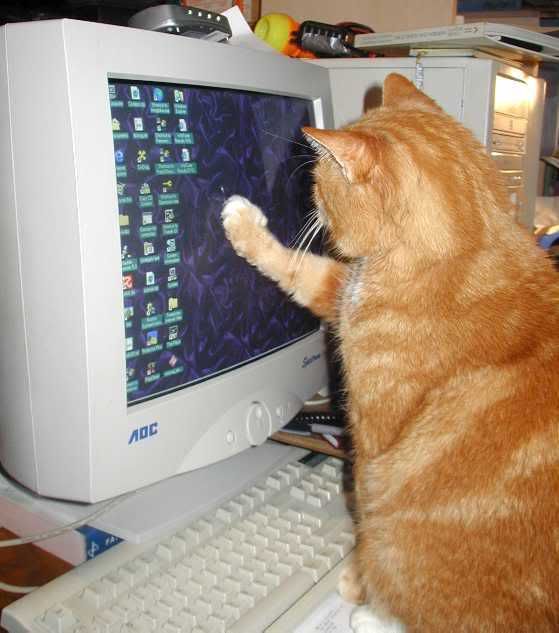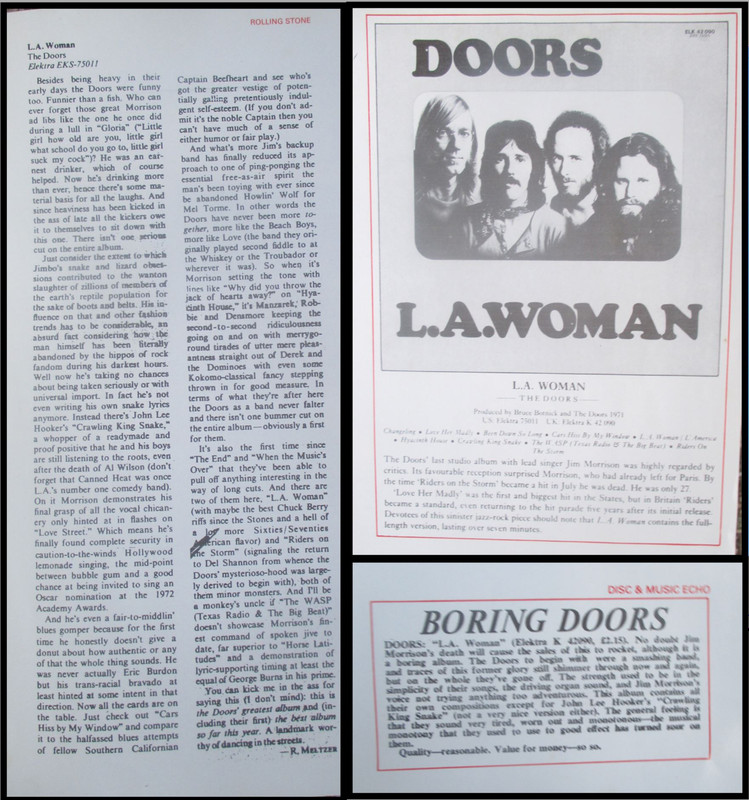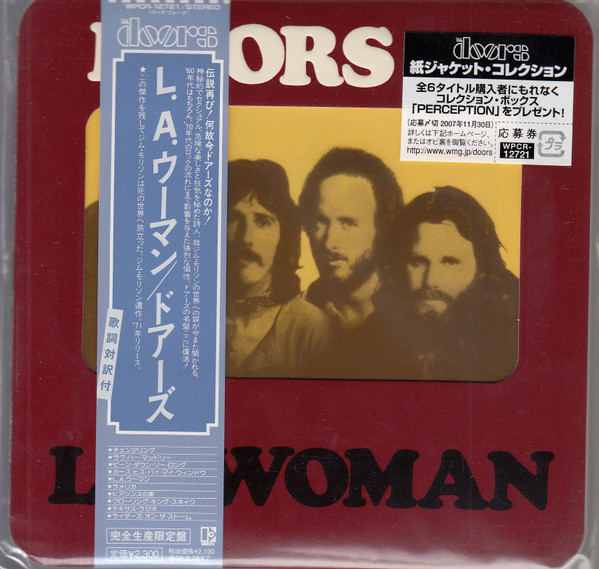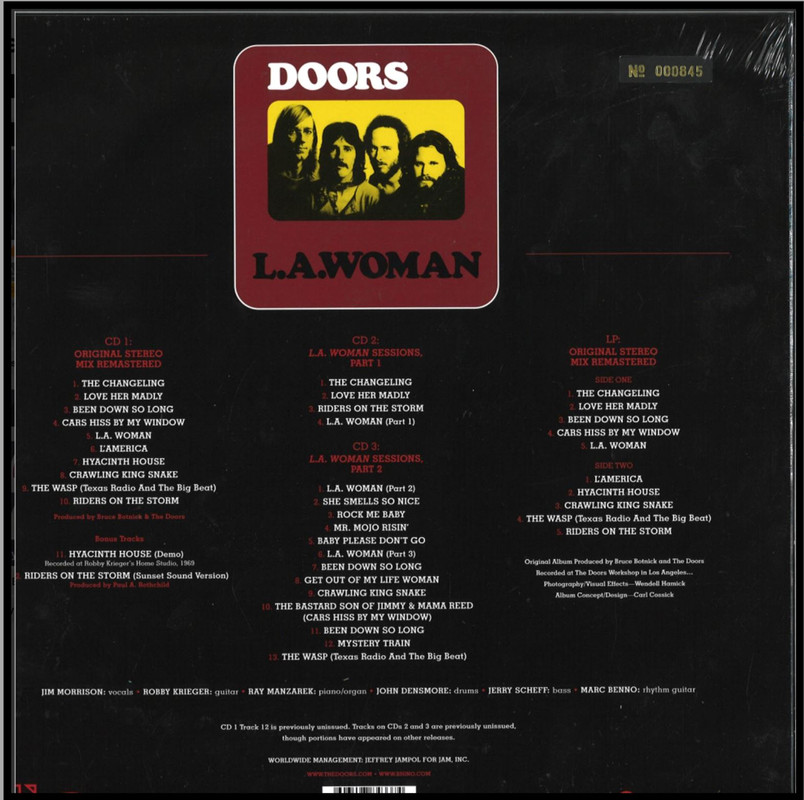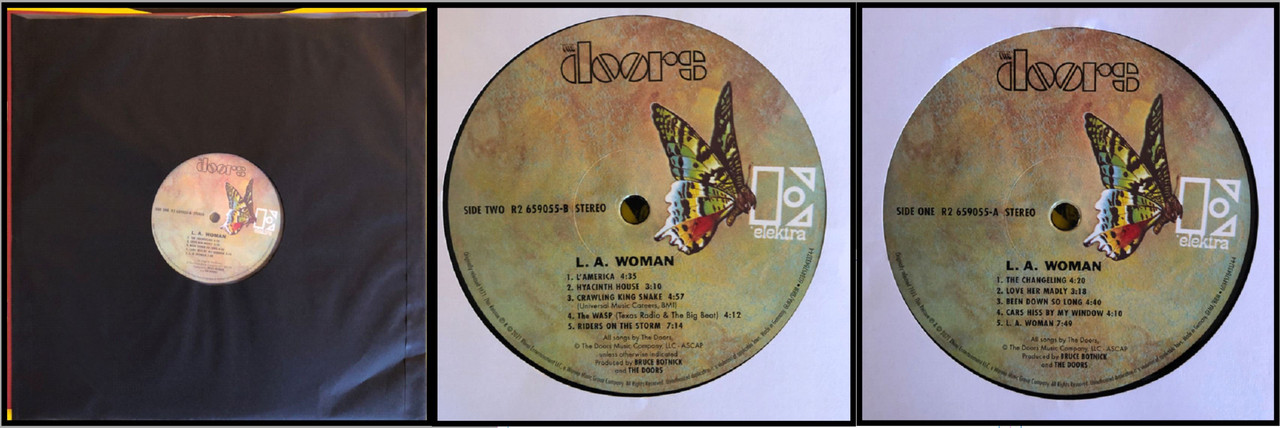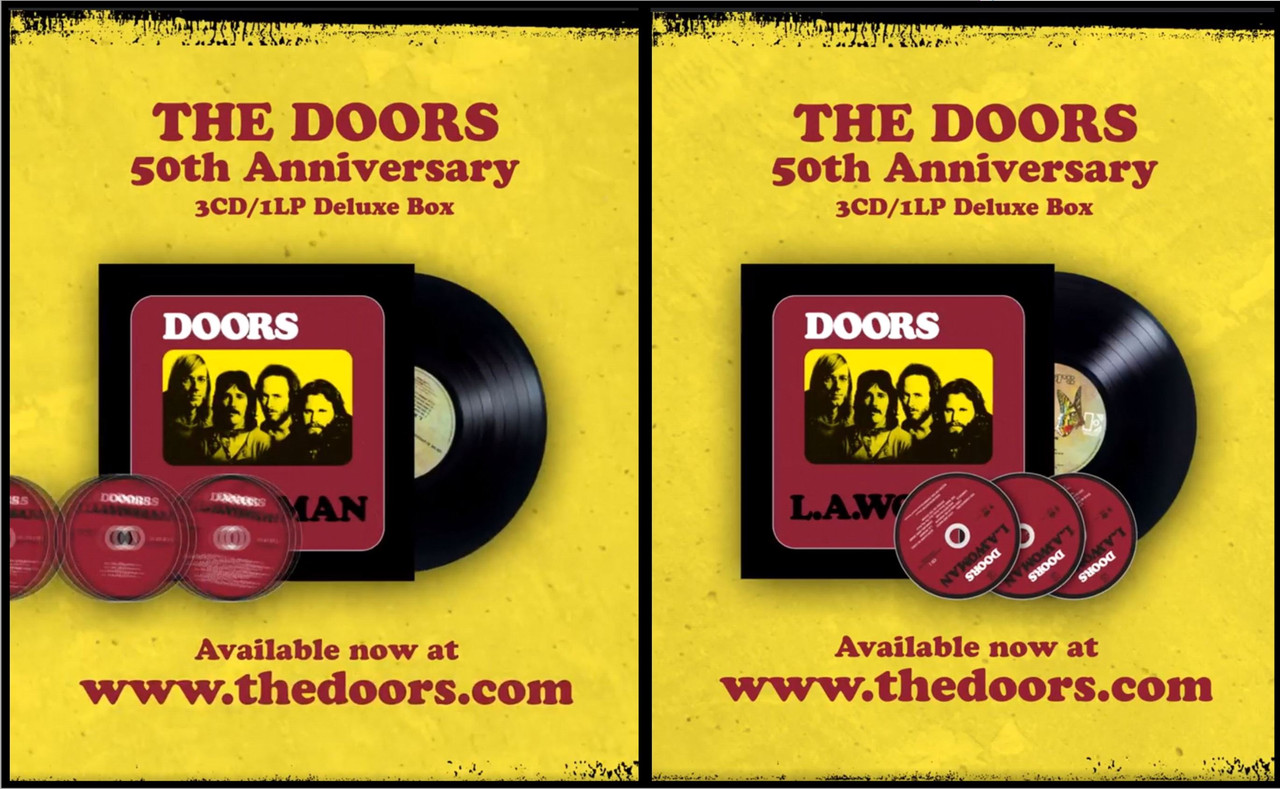|
|
Post by TheWallsScreamedPoetry on Oct 5, 2011 8:51:17 GMT
L.A. WOMAN
Released June 1971
Legend has it that L.A. Woman was cut entirely live.
Not entirely, but a lot of it was live, and the song “L.A. Woman” was completely live. I think that could be the quintessential Doors song, and the way we came up with it was amazing. We just started playing and it came together as if by magic. Jim made a lot of it up as he went along, which is amazing because I think it’s one of his most poetic songs. I can remember Jim sitting in the bathroom with the mic singing and all of us just having a great time.
That album was the first time you had a rhythm guitarist— Marc Benno.
That was basically just so we could do it live. It freed me up. And we thought it might add a different flavor. I actually enjoyed it, and I didn’t have to do as much overdubbing.
You still did some overdubbing; it sounds like there are at least four guitar tracks on “I’ve Been Down So Long.”
Yeah, there probably are. Ray played a guitar and Benno played, and I probably overdubbed one too. I think I also overdubbed two or three slide parts.
That slide solo is one of your craziest.
Definitely. I was just trying to capture a mood without worrying about technique.
The beauty of your slide playing — and your blues playing in general — is you don’t mimic the originators. And you never really cleaned your blues up — you left it a little messy. Some white guys tend to be very anal.
That’s right. That’s what I didn’t like about Mike Bloomfield — too perfect. I always just tried to do my thing. I could play traditional blues slide, but all the other guys reacted more enthusiastically to my untraditional slide playing. In fact, that’s what got me into the band. Jim always loved my slide playing—he wanted me to play it almost exclusively.
Did Jim ever critique your playing?
He would always tell me that I was the most underrated guitar player around. What’s funny is that the four of us hardly ever criticized the others’ playing—or even suggested anything. We worked so well together that we hardly ever had to talk about it. Everybody just played the right part in the right place at the right time.
“Cars Hiss By My Window” is a rather unusual blues.
Yeah. That was our Jimmy Reed piece. Jim was really getting into the blues at that time and he loved it when I would just play straight blues. He’d sit there and make up songs on the spot. He just wanted to play all night. It’s too bad because I really think that had we done another album it would have been a lot more straight blues stuff, which I always loved.
How did “Riders on the Storm” develop?
We were fooling around with “Ghost Riders in the Sky” one day and somehow it turned into “Riders on the Storm.” It just happened.
Another change on L.A. Woman is the absence of reverb, particularly on Jim’s voice, which was so heavily reverbed on your first few albums.
Well, Sunset Sound, where we recorded the first two albums, had one of the best echo chambers in the world. It was a live chamber, which they don’t make anymore. And it sounded so great that we used it a lot more than we might otherwise have. We piped everything through there.
But L.A. Woman was recorded on an eight-track in our rehearsal space and Paul Rothchild was gone, which is one reason we had so much fun. The warden was gone.
So, even after all your success, you still had that sort of relationship with the producer, where he was cracking the whip?
Yeah, we just kind of took it for granted that he would produce and we would do things his way — you stick with success. And, finally, he was like a rat deserting a sinking ship. I think he figured it was time to bail.
So there was a sense that the Doors were a sinking ship?
Yeah, definitely. We couldn’t play anywhere, we were fucked because of the Miami incident. Morrison Hotel didn’t do that well, Jim looked bad and was getting fat… All things considered, I thought it was pretty cool that L.A. Woman did well.
I think we came up with something so loose because there was no pressure. We figured we were already screwed, so we were having fun again. we were so far gone that it was like our first album.
Just weeks after the album entered the Top Ten, Jim was dead. Do you remember finding out?
Yeah. I got a phone call and I didn’t believe it because we used to hear shit like that all the time—that Jim jumped off a cliff or something. So we sent our manager off to Paris, and he called and said it was true.
People often talk about the inevitability of him dying young. Do you buy that?
No! I thought he would never die. I thought he’d outlive everybody, like one of those Irish drunks who’d drink a fifth of whisky a day and live until they’re 80. He seemed invulnerable, the way he would do things and jump out of windows without getting hurt. I never saw those things, but I would hear about them the next day. For some reason, he was fairly well behaved around me. Somehow our relationship developed where he stayed fairly calm around me, thank God. [laughs]
After Jimi Hendrix and Janis Joplin died, Jim supposedly told people that he would be the third to die at 27. Did you remember him saying such things?
Yeah. He was definitely obsessed with death. He talked about it all the time.
There’s always been talk that he’s not dead, and Ray has occasionally fueled that idea. Have you ever thought that?
Yes and no. I’ve allowed myself to fantasize at times, but I’m sure that if he wasn’t dead he would have gotten hold of us by now. But then again, if there’s anybody who could pull off something like that, it was him. I still think about him quite a bit. I always have dreams that he’s alive, and we’re playing together again. Wishful thinking.
Robby Krieger Guitar World June 2011
Read more: newdoorstalk.proboards.com/index.cgi?action=display&board=rki&thread=2098&page=1#ixzz1ZtaPCNM9
|
|
gizmo
Door Half Open
  
Posts: 113
|
Post by gizmo on Dec 2, 2011 1:01:46 GMT
i wouldn't be surprised as they announce that they found a rehearsal tape wich has enough songs for a complete new album  |
|
|
|
Post by TheWallsScreamedPoetry on Dec 2, 2011 9:24:59 GMT
We know that versions of LAW and ROTS were recorded in December 1970. We also know The Doors presented some tracks to Rothchild which he described as cocktail music and passed on producing.
What happened to these tapes we don't know. It's not likely Rotchild took them home with him so maybe The Doors do have them. Maybe they just got binned or wiped.
With this band you never know. I have never come across a more duplicitous bunch of untrustworthy bastards in all my years of listening to rock music.
|
|
|
|
Post by TheWallsScreamedPoetry on Jan 9, 2012 12:35:22 GMT
The Doors: LA Woman
This is a sad album! Not because it was released just before Jim died or because it was the final offering from The Doors but because of the songs. Jim’s lyrics did not fool the fans who cared about him. He had had enough and yet produced some of the most passionate lyrics of the bands career. This is the blues album he always craved but which his image denied him.
His voice is deep, throaty and just about surviving but this only serves to enhance the bluesy feel.
Opening with ‘The Changeling’ combining a rock solid beat with a harsh vocal, which is shocking after the mellow tones of Morrison Hotel, confirming what we all knew, that Jim was many people under one roof and didn’t care who knew.
‘Love Her Madly’ is the carnivalesque Doors with Jim’s double-track voice booming jauntily against a jazz piano doing justice to Robby's lovelorn lyric.
‘Been Down So Long’ seems to sum up the last few months of Jim’s time on earth and features his harsh bluesy voice bemoaning his lonely predicament in a totally tuneless tone.
Sanity is restored with ‘Cars Hiss By My Window’ which seems to be a rather personal reflection of an actual incident in that troubled life. Its blues orientated arrangement and softly subdued guitar against a lovely squashy drumbeat finishing with an astonishing howl at the end imitating a bottleneck guitar through a dish-cloth.
‘LA Woman’ is a tour-de-force for other Doors.
Although the lyrics are typically clever and personal it’s the instrumental which governs this song with Ray’s keyboard dominating a cracking overall sound leaving the listener breathless in the wake of its ingenuity.
‘L’America’ is an earlier recorded song written for the movie but failing to make the final ‘Zabriske Point’ soundtrack.
Jim is in great voice complimented by a quirky backing and some terrific off beat drumming which doesn’t grab immediately but gets there in the end.
‘Hyacinth House’ is a gem comprising a guitar riff that most bands would kill for. A hauntingly beautiful organ and such painful personal lyrics which scream for questions on Jim’s state of mind. This was a cry for help and is such an obvious statement of sadness it positively bellows ‘HELP!’ and nobody realised until it was too late. Or so John would have us believe but scepticism is rife in hindsight. For me this is the best track on the album.
‘Crawling King Snake’ is a song they had been performing live since the early days and Jim's voice is really strong against Robby’s searing guitar licks doing total justice to this classic blues that would seem to have been written with our boy in mind.
‘The WASP (Texas Radio & The Big Beat)’ is a Jim poem to a terrific blues backing dominated by John’s superb drumming. This is the up-beat version as opposed to the slow whispering version so beloved of the moody bluesy Jim. He is in fine voice belying the ravages his vocal chords had taken over the previous months.
The same can be said of ‘Riders On The Storm’, dismissed by former producer Paul Rothchild as ‘cocktail muzak’, a lovely tinkling piano runs through the song which contains some of Jim’s darkest lyrics. A booming bass-line heightens the downbeat atmosphere prevalent on this final vinyl offering. Jim controls his voice almost to a point of lethargy which only strengthens the mod of menace hidden in the seemingly innocuous lyric.
This was the bands most critically acclaimed album and a fitting epitaph to a frustrated blues artist who only realised his ambition when it was too late to be recognised it is a pity that critics didn’t pay more attention to the music earlier instead of trying to provoke hysteria of the wrong sort from an ever gullible public.
Although Jim always gave the impression that he didn’t pay any attention to criticism wouldn’t it have been nice to think that earlier in the bands career he could have read something favourable?
Success isn’t always the criteria by which favourable reviews are measured unfortunately.
Rest in Peace babe!
By Sue Jeffries from Walsall
## Sue used to run the UK Doors fanclub
|
|
|
|
Post by TheWallsScreamedPoetry on Feb 1, 2012 14:22:11 GMT
Review from Classic Rock March 2012  |
|
|
|
Post by TheWallsScreamedPoetry on Nov 20, 2012 11:44:16 GMT
Chapter # 29
Follow The Music

A producer tears his hair ... A storm rider walks away ... LA Woman, this is the end
JAC: When I gave the Doors back their publishing and paid the audit without contest, Elektra received in return an additional album at a royalty of ten percent. Paul Rothchild was slated to produce, as usual. I hadn't heard any of the tunes, but Bill Siddons thought the band was ready. I was praying it would be simple and go down easy, because I was sure Jim wouldn't make it through interminable sessions like "Soft Parade" and "Morrison Hotel." But "Morrison Hotel" had gone gold in two days, and the chance for one more album was enormously attractive. I'd deal with the future of the group after that.
BILL SIDDONS: Paul was a very exacting and professional producer, very demanding, didn't take any bullshit from anybody and was capable of provoking Jim into performing. But he was also a dictator, and his personality was so strong that it had begun to cause problems. And now they wanted to be in control of their own destiny.
"Morrison Hotel" was the record that killed them. Paul made a record that was a great bunch of songs, but so well produced and so perfect that I didn't feel them anymore. When I heard those songs live, they were a completely different experience, and I felt Paul lost what he was there to do. I was the guy that lived the live end of the business. They wouldn't go on stage without me being there. That was the part I lived, and then we'd get these records that I thought was a different band. It just wasn't what I thought the Doors to be, and I think it was because of Paul's mania for detail. Where I'd hear it and go, "Yeah, great!" he'd hear it and go, "Oh, no, the harmonic sibilance there was causing this to"—Who cares? Paul cared because he heard and understood. He was brilliant and totally knew the recording process, but took it to a point of refinement that lost the soul, and when I didn't hear the soul I knew he was the wrong guy.
ROBBY KRIEGER: Paul was the King of Slow. Not slow, but take after take. And we thought by that time we had earned the right to be able to pick our takes. Not to have to do eight million takes to make sure we got the perfect take.
BILL SIDDONS: The band developed all the songs. It was a real difficult process at that point, because there was a lot of distrust, a lot of arguing over who wrote what.
PAUL ROTHCHILD: Two months of rehearsals—boring as hell.
JAC: Paul heard all the songs and thought it might take another year, which I knew was both an exaggeration and an impossibility. You could sense that Jim was getting terminally itchy and the boys were on edge also.
PAUL ROTHCHILD: I had just finished the Janis Joplin album, completed after she died, which was a labor of love. I was very proud of it. And here I'm confronted by the Doors, and they're turning out shit. Two good songs, 'LA Woman' and 'Riders on the Storm,' and the rest is lounge music. Two weeks into production, I quit.
BRUCE BOTNICK: We were in the studio and the band was playing and he turned to me and put his head in his hand and he said, "I can't do this anymore."
PAUL ROTHCHILD: I quit because I had grown tired of dragging the Doors from one album to another, especially dragging an unwilling Jim through being a performer, and he had virtually dried up. It had been getting harder and harder, and more expensive, and less fun. Purely because of Jim. Two out of three times Jim would either not want to work or would go out into the studio drunk. He would intentionally disrupt things, pull things off course. Never fruitfully. Most of the energies were spent trying to get Jim coordinated with the group.
ROBBY KRIEGER: It was a question of how far out he would go. The further out he went, the more we would have to bend in his direction to keep it all together.
JAC: The band itself was never less than solidly consistent. The variable was Jim. Poor Rothchild tore his hair, what he had left of it, and did a hundred takes, and finally he just couldn't go to the well anymore. He was exhausted, and so were the Doors.
BRUCE BOTNICK: We went off to a restaurant down the street, and in the meantime Paul called Jac, and then he told the guys he couldn't do it, and we went back to the studio and he had gone home. And I know what he felt like. He was a free man.
JAC: There was no point in forcing an issue that couldn't be forced. I talked it over with Bruce and Bill Siddons and suggested that they and the group sort it out and I would support any reasonable idea they came up with. I had come to respect Bill's judgment highly, and I was certain that when it came to records that would be in the bins for years to come, the band wasn't about to slack off.
BRUCE BOTNICK: The boys said to me, "What are we gonna do?" I said, "We can make this album together."
We sat down and figured it out. I didn't want to go back into the Elektra studio. I thought, "Let's go to Sunset Sound and see if we can get some of the old magic back." But things had changed a lot there, it wasn't the same anymore. I said, "Where do you feel most comfortable?" They said, "Our rehearsal hall." I said, "That's what I think too. Why don't I get the console and the eight-track that came down from Paxton. We've got all this gear, I'll take it across the street and build a control room."
And Jac said, "Fine." He didn't question it for a second. Here's the major act on the label, and he's trusting it to a twenty-three-year-old kid.
JAC: I wasn't a bit worried about Bruce. He had contributed brilliantly to every note the Doors had recorded. Robby's point about the band making its own choices was fair. They had more than earned the right.
BRUCE BOTNICK: It came together without much rehearsal, like a day or two. They felt, like I felt, free as well. Paul felt he was free, and we were now free of him. No reflection on Paul—it's just that, you do it long enough, and under that control, and now it was like school's out, and we just had a ball.
BILL SIDDONS: One day at rehearsal Jim drank thirty-six beers.
ADAM HOLZMAN: I went to some of the rehearsals. I was a little hippie at that point, wearing a headband. Jim was nice to me, he'd say, "Hi, how are you doing?" One day he showed up late, and he gave each of the guys in the band a dollar because he was late.
BRUCE BOTNICK: We recorded it live, really wanted to get back to the basics.
JAC: I never felt that returning to eight-track from sixteen-track was a step backward. You pick the tool you need to do the job, and eight-track was more than sufficient for an organic location recording, which is what this was. Fewer tracks meant fewer mikes and less problems with microphone phasing, always a consideration in ad hoc studios. The result was a return to the original Doors sound, before all the distractions of fame and fortune got in the way.
I purposefully stayed away from the sessions except for one evening. I walked across to the Doors office and rehearsal space and saw the desks pushed off to the side, heavy mover's quilts nailed to the walls, the windows covered, and Bruce, a floor above in Bill Siddons' office, with console, speaker and tape recorder, the bare minimum of everything. There was a lot of running up and down because Bruce was out of sight of the band, which probably was a plus. There were no visual clues. It was so spartan and so right.
JOHN DENSMORE: I think "LA Woman" is kind of like the first punk album. It's really raw and there are mistakes. But the concept was to just go for it—try to get in tune, but if the passion is there and you hit a few wrong notes, that's alright. Garages are where this music started, you know, let's not get too pristine.
BRUCE BOTNICK: We recorded the entire album and mixed it in ten days, and I remember the day we were supposed to start mixing it was the LA quake.
I finished the album and took it to play for Jac at Elektra with the Doors—without Morrison, who would never appear—and Jac sat there and wept.
JAC: I had been worried about the material because of Paul's negative comments, but the album knocked me out, song after song.
BILL SIDDONS: Jac listened to the whole album, and then said that 'Love Her Madly' is a Top-5 record, and 'Riders On The Storm' will get more FM airplay than any Doors LP cut, and song by song he ran down exactly what happened. The Doors said, "Wait a minute. We think "The Changeling" is the single. That's what we want out, because that's the most credible musically." Jac sat there and looked at them like they were nuts and said, "It's not a hit. "Love Her Madly" is a hit." And they said, "No." The meeting ended and he hadn't swayed them at all. It took about two weeks to get them to go with the obvious hit.
"LA Woman" EKS-75011
JAC: I wasn't sure there'd be another album ever, so I had Bill Harvey create a collector's cover. The Doors' faces were printed on clear film. The backing color of the inner sleeve could be changed and would affect the mood of the package. This is the first album on which Jim is bearded. His photo is on the right, no bigger, no smaller than the others, just another guy in the band.
|
|
|
|
Post by TheWallsScreamedPoetry on Nov 14, 2022 21:00:32 GMT
  Uncut July 2021  Creem 1971 |
|
|
|
Post by TheWallsScreamedPoetry on Aug 3, 2023 10:30:52 GMT
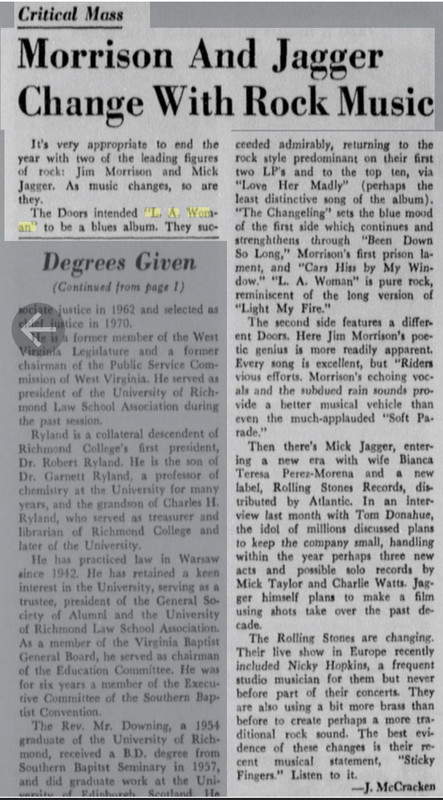 21-5-1971 The Collegian — University of Richmond 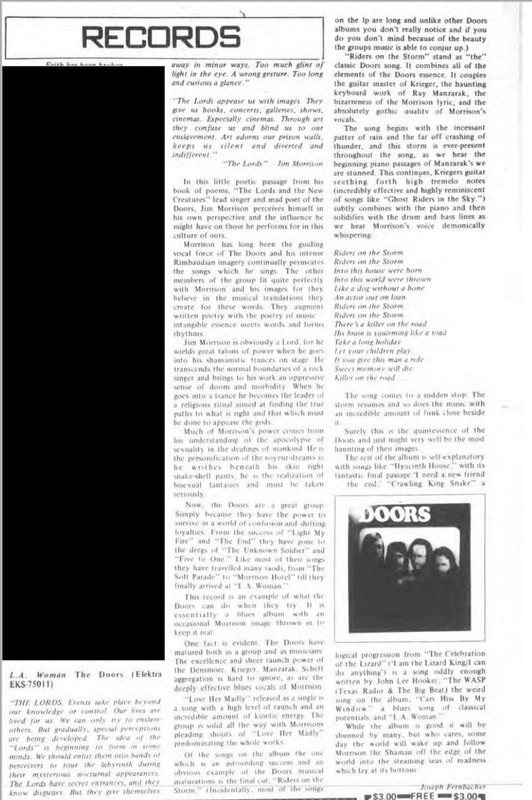 7-5-1971 Buffalo Spectrum NY 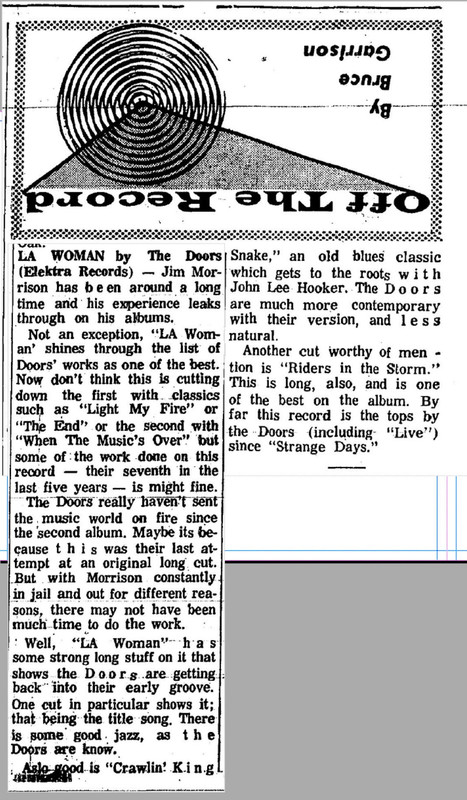 29-5-1971 Hattiesburg American MS A uniquely rare copy of LA Woman signed by all 4 Doors.
A rather grand looking certificate of authorisation comes with it but it is probably real.
Unlike the WSITG copy signed by Jim that did the rounds on e-bay.
Doubt there are many of these around.  |
|
|
|
Post by TheWallsScreamedPoetry on Oct 20, 2023 12:23:08 GMT
a
|
|
|
|
Post by TheWallsScreamedPoetry on Nov 25, 2023 16:52:56 GMT
|
|
|
|
Post by TheWallsScreamedPoetry on Dec 1, 2023 12:53:11 GMT
LA Woman 24 Carat Gold Edition 1994 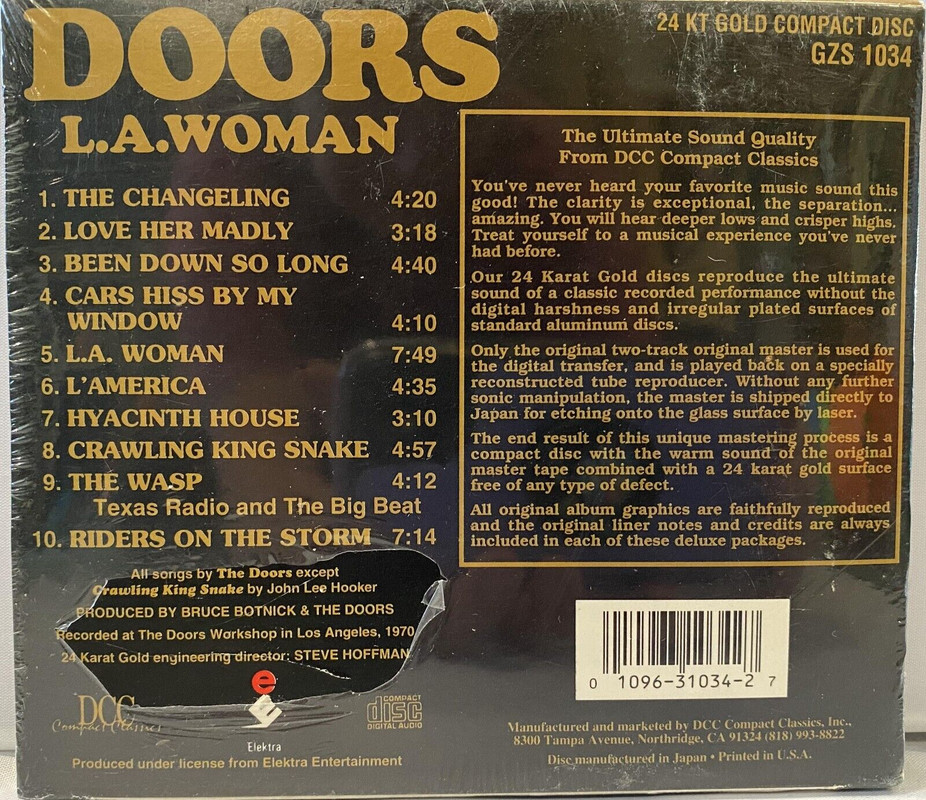    
|
|
|
|
Post by TheWallsScreamedPoetry on Jan 6, 2024 16:18:31 GMT
LA Woman 40th Anniversary CD Album 2011 Fans of iconic rock band THE DOORS are in for something special. The group s final album--1971 s L.A. WOMAN, with the signature hits L.A. Woman, Love Her Madly and Riders On The Storm --is being celebrated with a special two-CD release from Rhino.
The L.A. WOMAN 40th anniversary edition (Rhino 2-CD) features a never-before-heard song, She Smells So Nice, which captures the band--organist RAY MANZAREK, guitarist ROBBY KRIEGER, drummer JOHN DENSMORE and late singer JIM MORRISON--joyfully barreling through a full-throttle original before segueing into the blues standard Rock Me. As the song closes, Morrison can be heard chanting, Mr. Mojo Risin --an anagram of his name that was made famous during the bridge of L.A. Woman. The track was recently discovered by producer Bruce Botnick while reviewing the L.A. WOMAN session tapes.
In addition to She Smells So Nice, the second disc of the L.A. WOMAN reissue includes eight never-before-heard versions of songs from the album. Alternate takes of L.A. Woman, Love Her Madly and Riders On The Storm offer a fresh view on this landmark album, which was the group s sixth straight Top 10. The studio chatter between the songs is a revelation, transporting listeners to The Doors Workshop: the West Hollywood rehearsal space where they recorded the album with Botnick. One segment in particular captures a fascinating moment of inspiration when Morrison suggests they add the now-iconic thunderstorm sound effects to the beginning of Riders On The Storm.   TRACK LISTING: TRACK LISTING:
Disc: 1
1. The Changeling
2. Love Her Madly
3. Been Down So Long
4. Cars Hiss By My Window
5. L.A. Woman
6. L America
7. Hyacinth House
8. Crawling King Snake
9. The WASP
10. Riders On The Storm
Disc: 2
1. The Changeling (Alternate Version)
2. Love Her Madly (Alternate Version)
3. Cars Hiss By My Window (Alternate Version)
4. L.A. Woman (Alternate Version)
5. The WASP
6. Been Down So Long (Alternate Version)
7. Riders On The Storm (Alternate Version)
8. She Smells So Nice
9. Rock Me
 To mark the 40th anniversary of the Doors' classic L.A. Woman album, Rhino is set to release a two-disc reissue with alternate takes including "Love Her Madly," "Riders on the Storm" and the title track, as well as a never-before-heard original, "She Smells So Nice." The upcoming release and a companion DVD on the making of the album will kick off the band's "Year of the Doors." To mark the 40th anniversary of the Doors' classic L.A. Woman album, Rhino is set to release a two-disc reissue with alternate takes including "Love Her Madly," "Riders on the Storm" and the title track, as well as a never-before-heard original, "She Smells So Nice." The upcoming release and a companion DVD on the making of the album will kick off the band's "Year of the Doors."
Producer Bruce Botnick recently discovered "She Smells So Nice" while reviewing the album's session tapes for the reissue. The L.A. Woman reissue is due January 24th, but you can hear an exclusive preview "She Smells So Nice"
Sounds really quaint ;) Bruce discovers new tape of stuff when checking around for 40 year reissue......but of course why then did he not find this when doing exactly the same for the 2007 40 year reissues????
The question was asked and Jeff Jampol told a bare faced lie that no LAW out takes existed.
Any Doors fan fool enough to believe that a tape had somehow become wedged down the back of a sofa or was hidden away in a draw for 40 years is a bit naïve.
These people always had a 40 year LAW in mind and simply kept the tape back and sold us another copy of LAW.
I did look forward to hearing all this but have nothing but contempt for The Doors and their crooked underhanded rehashing of endless Doors albums. :'(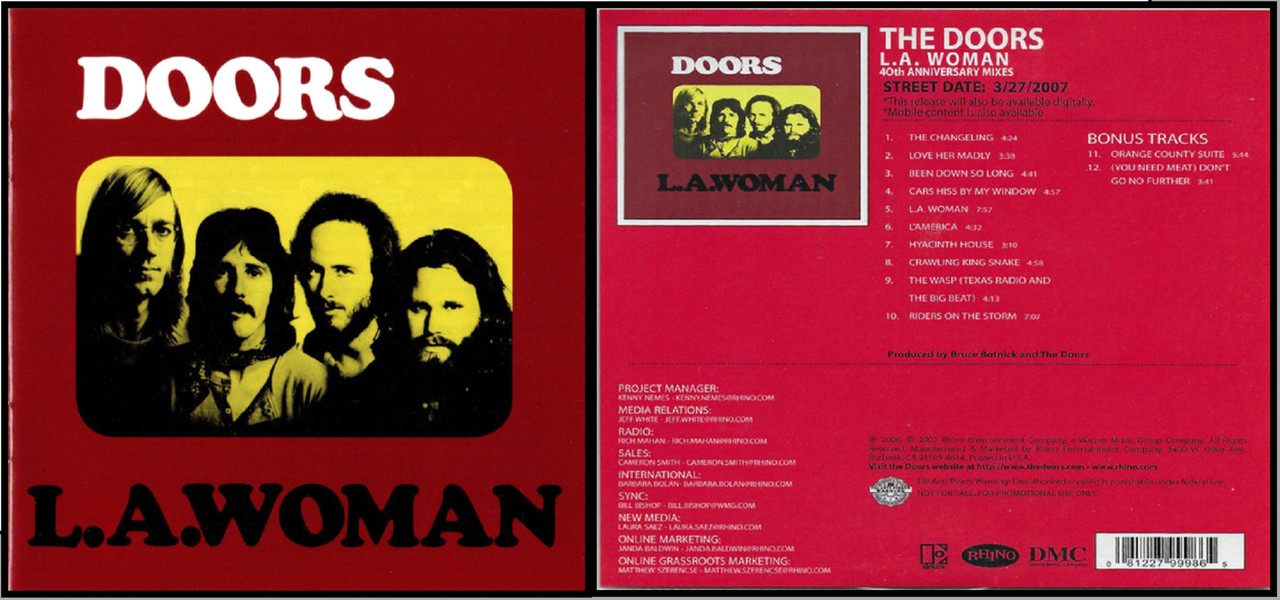 From The Doors 40th Anniversary 2007The Booklet From The Doors 40th Anniversary 2007The Booklet         
|
|
|
|
Post by TheWallsScreamedPoetry on Jan 8, 2024 11:45:37 GMT
A couple of different formats for LA Woman.
Elektra was not afraid to try something new.
Their laser disc a good example along with Quad, Reel to Reel and the most useless format ever invented 8-Track tape.REEL TO REEL
 





8 TRACK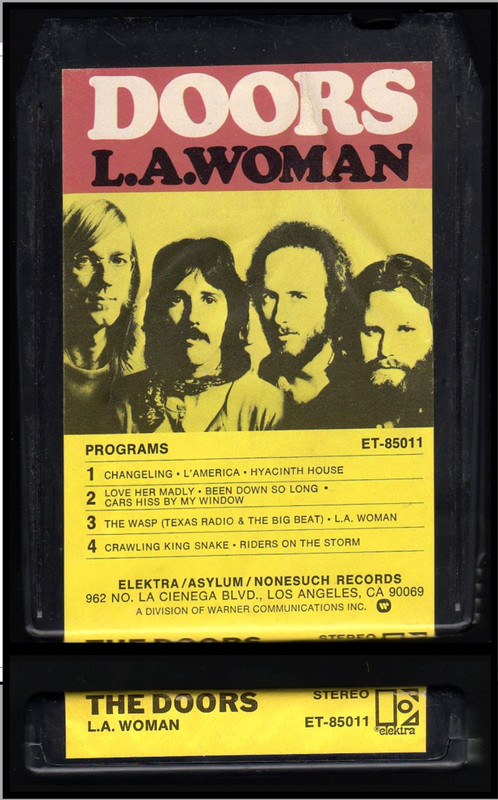 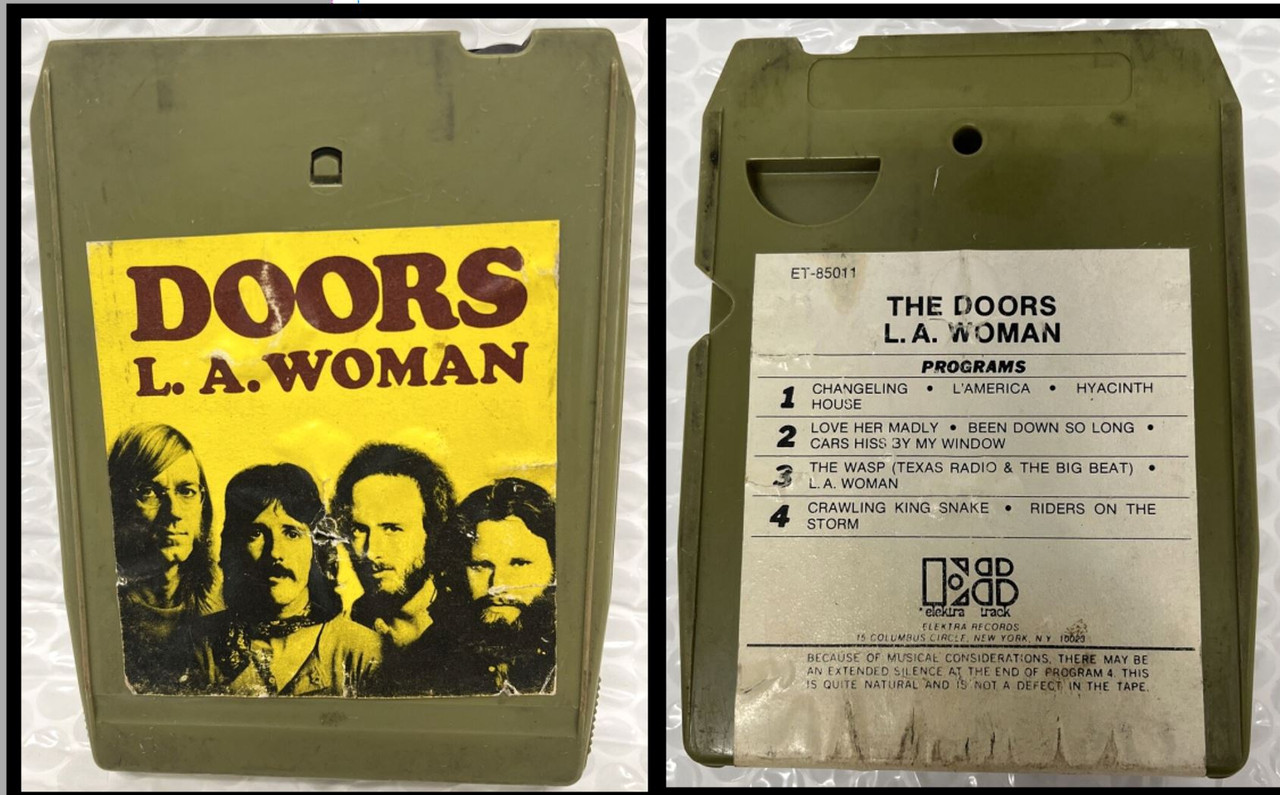 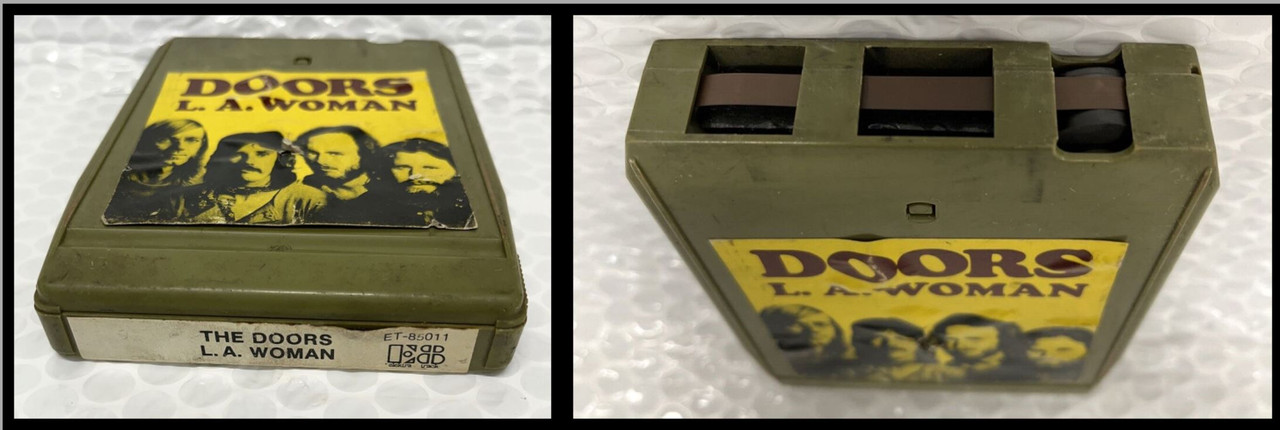 When it came out a mate of mine bought an 8-Track player for his car. When it came out a mate of mine bought an 8-Track player for his car.
It was like a cassette but 100 times bigger and 200 times as useless.
He soon dumped it and got a cassette player again.
What happened to his collection of 8 Track tapes God alone knows.
|
|
|
|
Post by TheWallsScreamedPoetry on Jan 8, 2024 17:46:09 GMT
|
|
|
|
Post by TheWallsScreamedPoetry on Jan 30, 2024 11:20:43 GMT
a
|
|
|
|
Post by TheWallsScreamedPoetry on Feb 9, 2024 18:04:39 GMT
 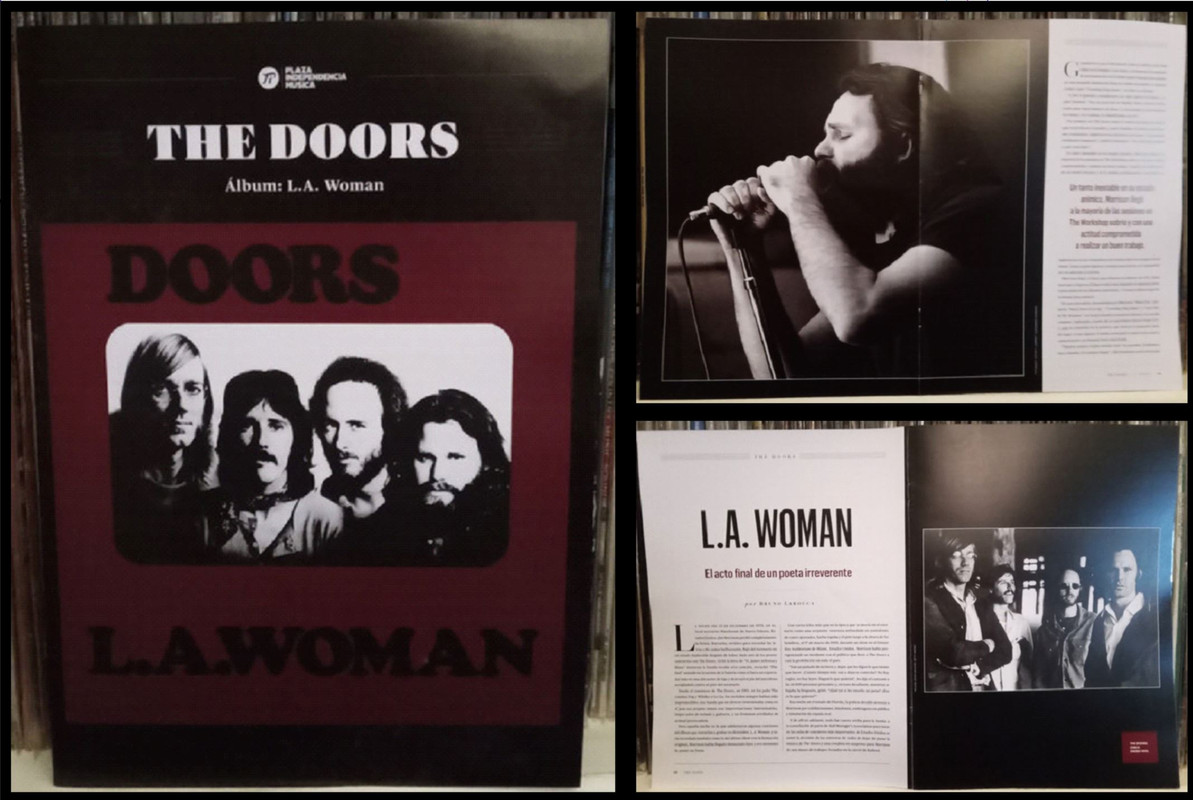 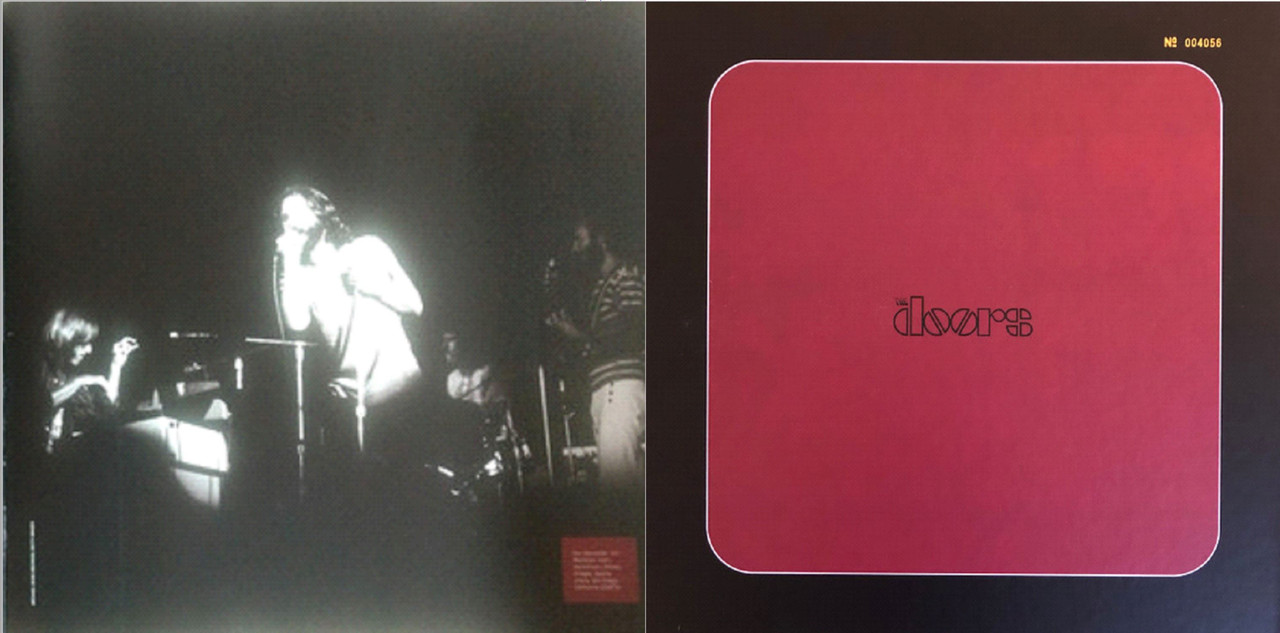 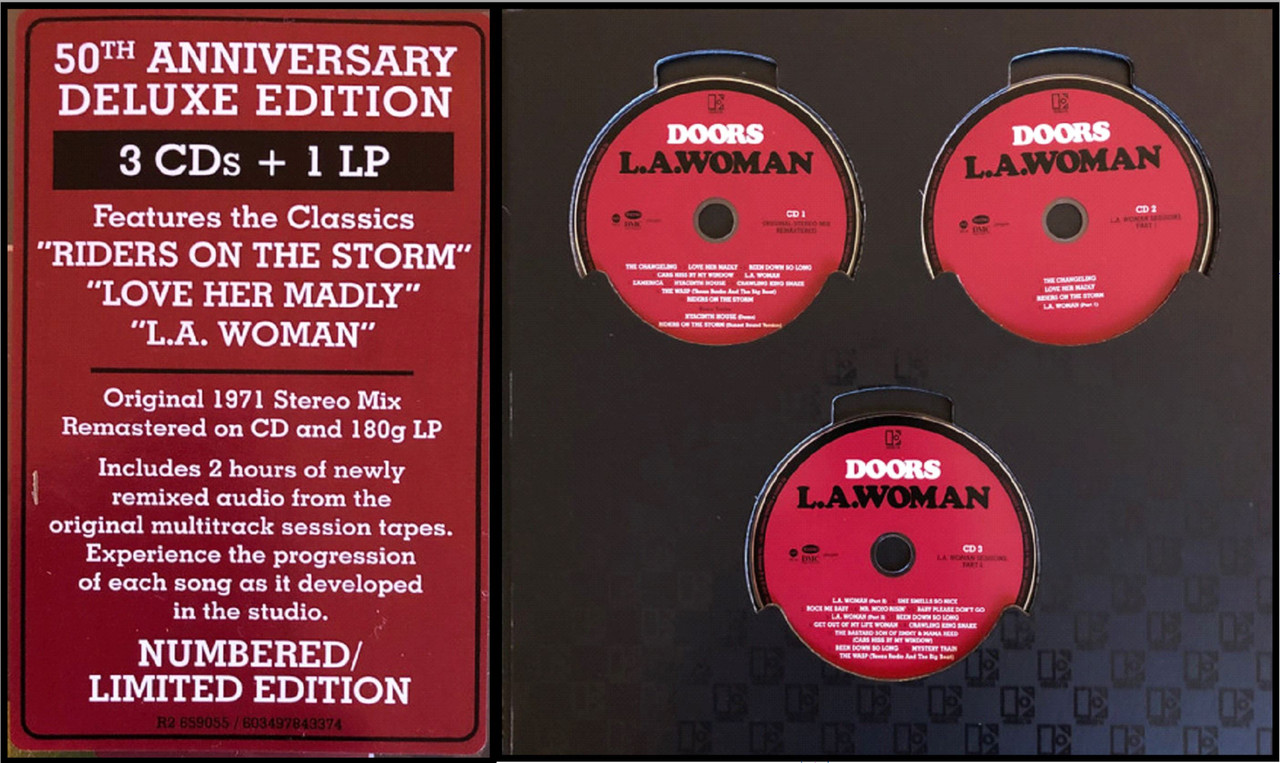  Gold Disc For 1 Million Sales USA Gold Disc For 1 Million Sales USA

Platinum Disc For 1 Million Sales Worldwide.
|
|
|
|
Post by TheWallsScreamedPoetry on Mar 21, 2024 10:59:31 GMT
|
|
|
|
Post by TheWallsScreamedPoetry on May 17, 2024 9:39:01 GMT
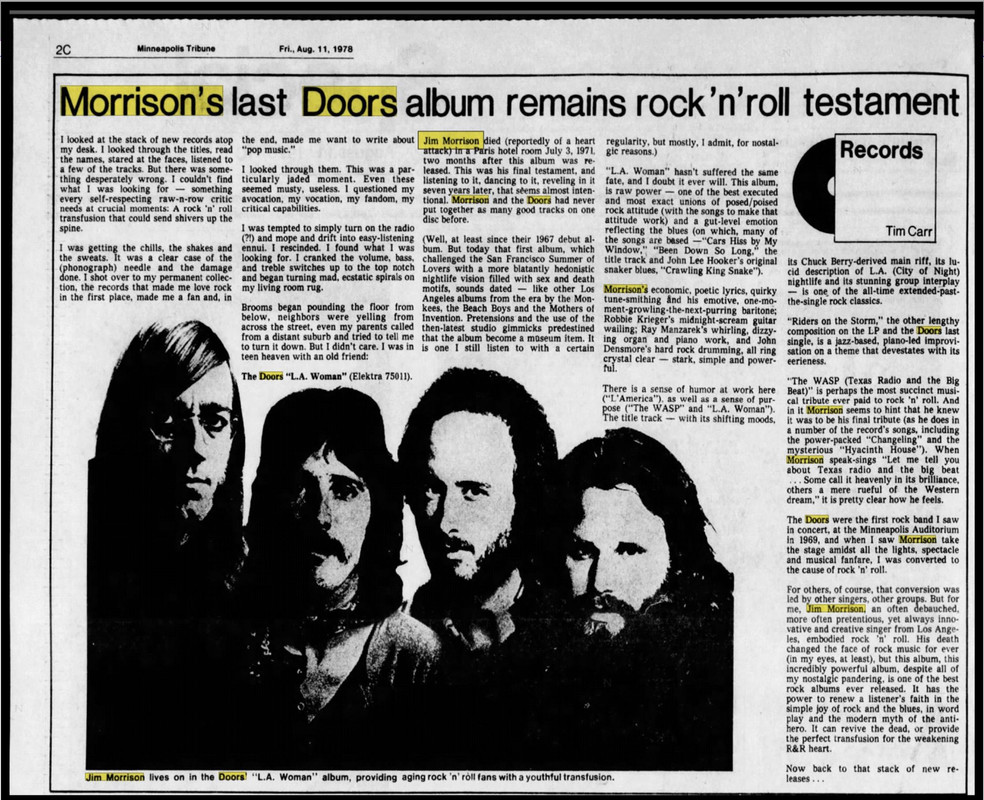 11-8-1978 Minneapolis Star Tribune MN  |
|
|
|
Post by TheWallsScreamedPoetry on Jun 4, 2024 9:42:04 GMT
This is interesting. Here Jim has listed his ideas for a 6th and possibly 7th Doors LP.
The band had originally signed for 7 albums and Absolutely Live was album #6 but this seems to count just the studio LPs so a possible follow up to LAW LP?
L'America had likely already been recorded for a film which was rejected by the film makers.
The Changeling and Cars Hiss By My Window made the cut into LAW but was this before ROTS and LAW the song appeared?
We know it was inspired by playing Ghost Riders In The Sky. So was this before any sessions for working up LAW songs?
Seems likely.
Away In India was recorded during LAW sessions but not used.
It was part of ROTS and featured in the Snoop Dog version of ROTS.
 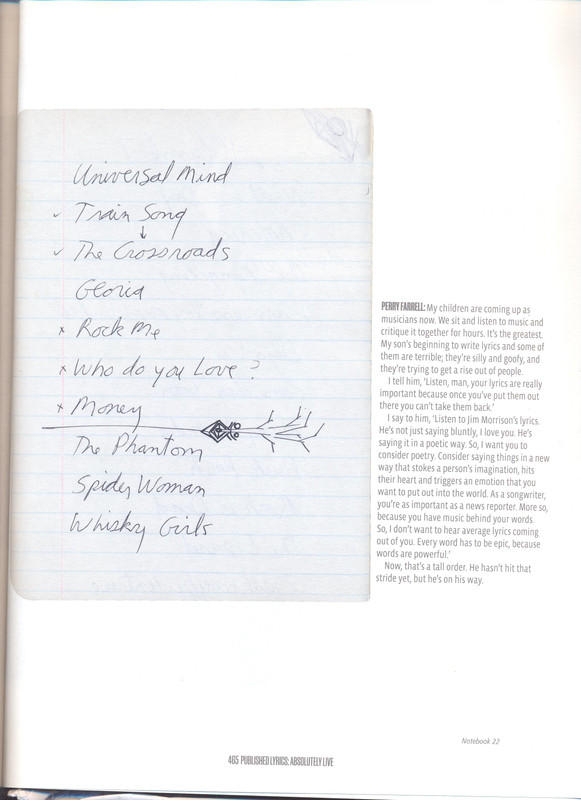
|
|
zaval80
Door Slightly Ajar
 
Posts: 79
|
Post by zaval80 on Jun 5, 2024 23:53:09 GMT
This one IMO was compiled right after Morrison Hotel. It's strange (or maybe telling?) that "Been Down So Long" is missing from the list. I also wonder whether "Deja Vu" is "Palace In The Canyon". "Away In India" as a standalone, very intriguing, as the other ones from the medley are listed separately. "Push Push", LOL. No "Paris Blues", BTW.
Have to check that Snoop remix, thank you, wasn't aware of this. Do you know a source for this, India having ever been a part of ROTS?
L'America is a Sept 1969 or so outtake from before MH.
|
|

